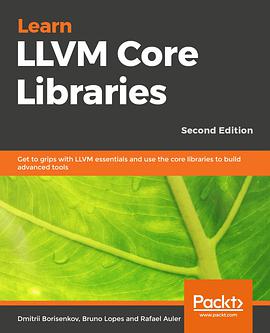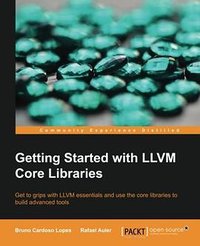Learn LLVM Core Libraries, 2nd Edition
Douban
Get to grips with LLVM essentials and use the core libraries to build advanced tools
Dmitrii Borisenkov / Bruno Lopes …
overblik
Overcome the steep learning curve to start effectively using LLVM libraries and tools
Key Features
Learn how to configure, build, and use LLVM and Clang based tools,
Explore the depths of the LLVM front-end, IR, code generator, and libraries, and learn how a modern compiler is implemented in a practical way,
Customize your project to benefit from Just in Time compilation (JIT), static analysis and source-to-source transformations.
Book Description
This book is intended for enthusiasts, computer developers, and compiler engineers interested in learning about the LLVM framework internals as well as for C++ software engineers keen to use compiler-based tools for code analysis and improvement. You need a background in C++ and, although not mandatory, should know at least some compiler theory. Whether you are a newcomer or a compiler expert, this book provides a practical introduction to LLVM and avoids complex scenarios. If you are interested enough and excited about this technology, then this book is definitely for you.
LLVM is a leading compiler technology framework. Easily extendable and designed as a multitude of libraries, LLVM provides a smooth experience for compiler newcomers and reduces the steep learning curve often associated with compiler development. To start, this book will show you how to configure, build, and install LLVM libraries, tools, and external projects. Next, you will be introduced to LLVM design and how it works in practice throughout each LLVM compiler stage: frontend, optimizer, and backend. The final chapters of this book will address just-in-time compilation issues. Despite initially LLVM was not designed as a JIT-compiler, high demand for dynamic languages pushed the community to implement JIT-compilation features in LLVM. The book will summarize the current state of JIT-compilation support LLVM provides.
By the end of the book, with multiple hands-on examples and source code snippets, you will be able to put a solid and smooth first step into the LLVM compiler development framework.
What you will learn
Understand LLVM compiler high-level design
Extend the compiler frontend, optimizer and backend
Use LLVM as a just-in-time compiler
Understand an architecture description with TableGen
Use compiler-based tools to improve the quality of code in a C++ project
Understand how clang based tools could help even in non-compiler development
Understand LLVM coding style and coding practice
Who This Book Is For
This book is intended for enthusiasts, computer science students, and compiler engineers interested in learning about the LLVM framework. You need a background in C++ and, although not mandatory, should know at least some compiler theory.

